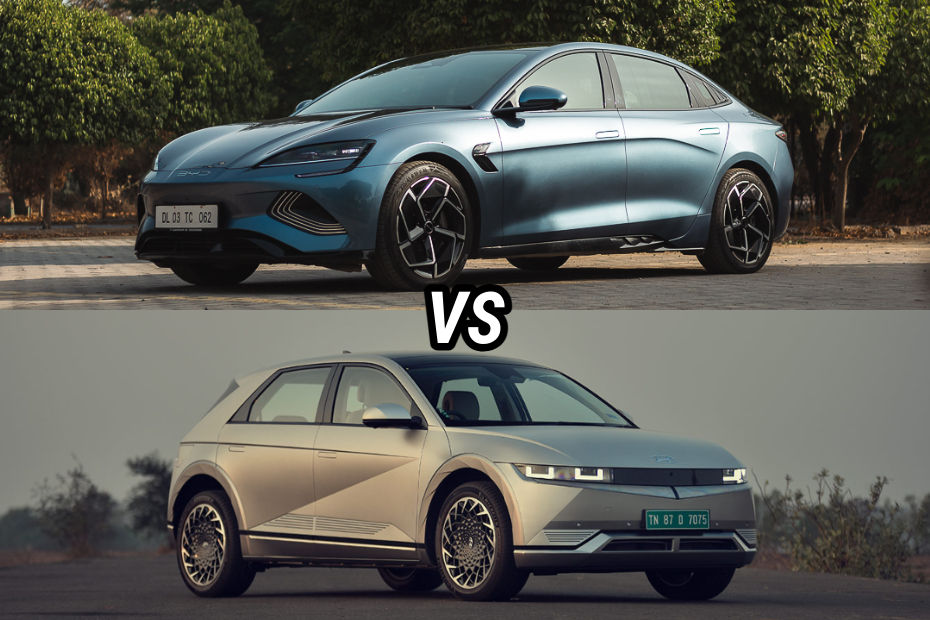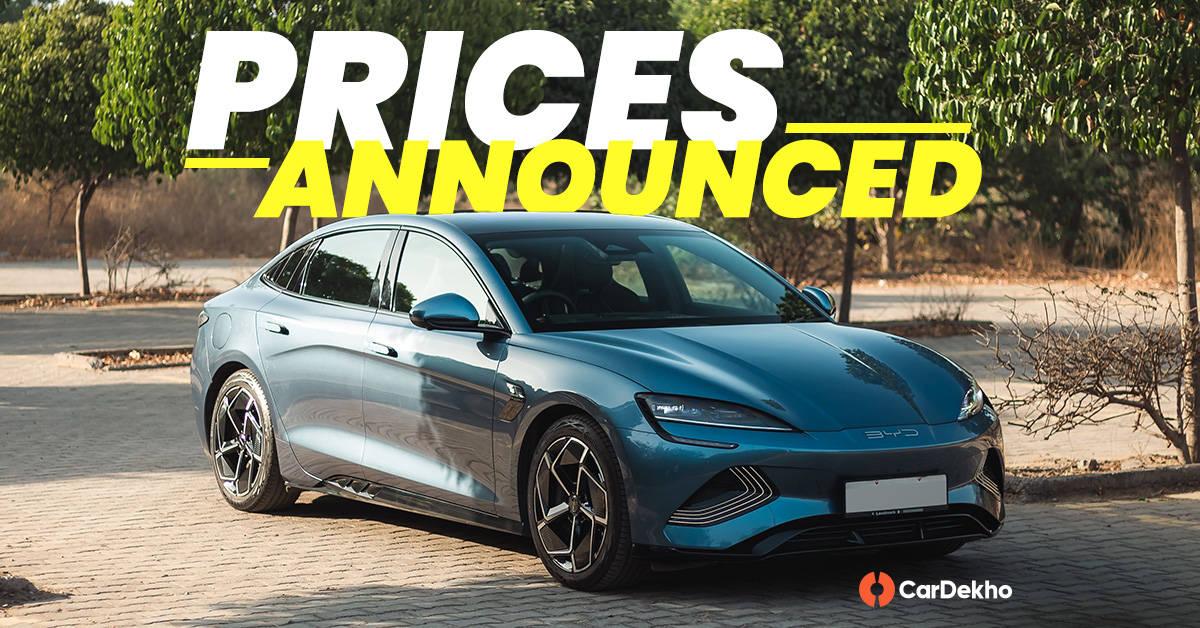BYD Seal Premium Range vs Hyundai Ioniq 5: Specifications Compared
Modified On Apr 25, 2024 12:17 PM By Shreyash
- Write a comment
Both, the Seal and Ioniq 5, are feature-packed EVs, though the Seal offers more performance with its larger battery pack

If you are looking for a premium EV priced under Rs 50 lakh, you now have a couple of options to choose between, like the recently launched BYD Seal and Hyundai Ioniq 5. The BYD Seal is a premium electric sedan, while the Ioniq 5 is a premium electric SUV crossover. The mid-spec Premium Range variant of the Seal is closely priced to Hyundai’s EV. Let’s compare them in terms of specifications and features on paper, but first, here is how they are priced.
Price
| BYD Seal Premium Range |
Hyundai Ioniq 5 |
| Rs 45.55 lakh |
Rs 46.05 lakh |
-
The Premium range variant of the BYD Seal is Rs 50,000 more affordable than the Hyundai Ioniq 5. Note that Ioniq 5 is only offered in a single variant.
Dimensions
| Models |
BYD Seal |
Hyundai Ioniq 5 |
| Length |
4800 mm |
4635 mm |
| Width |
1875 mm |
1890 mm |
| Height |
1460 mm |
1625 mm |
| Wheelbase |
2920 mm |
3000 mm |

-
Being a sedan, the BYD Seal is 165 mm longer than the Hyundai Ioniq 5. However, the Ioniq 5 is still 15 mm wider and 165 mm taller than the Seal electric sedan.
-
Despite being longer, the wheelbase of the BYD Seal is 80 mm shorter than that of the Hyundai Ioniq 5.
- One can assume that in terms of cabin room, the Hyundai EV might have an advantage over the BYD electric sedan.
Battery Pack & Electric Motor
| Specifications |
BYD Seal Premium Range |
Hyundai Ioniq 5 |
| Battery Pack |
82.56 kWh |
72.6 kWh |
| Drive Type |
RWD |
RWD |
| Power |
313 PS |
217 PS |
| Torque |
360 Nm |
350 Nm |
| Claimed Range |
650 km |
631 km |
-
The mid-spec BYD Seal uses a larger battery pack than the Hyundai Ioniq 5, but the claimed range advantage stands at just 19 km.

-
The mid-spec BYD Seal uses a larger battery pack than the Hyundai Ioniq 5, but the claimed range advantage stands at just 19 km.
-
The Seal electric sedan offers 96 PS more power than the Ioniq 5. However the difference between the torque output of both EVs is just 10 Nm, with the Seal having the higher torque output.
-
Both EVs here feature a single electric motor driving the rear wheels.
Also Check Out: Production-spec Mercedes-Benz EQG Breaks Cover! All-electric G-Class Packs Over 1,000 Nm and 4 Gearboxes
Charging
| Specifications |
BYD Seal |
Hyundai Ioniq 5 |
| Battery Pack |
82.56 kWh |
72.6 kWh |
| AC Charger |
7 kW |
11 kW |
| DC Fast Charger |
150 kW |
150 kW ,350 kW |
-
In comparison to the BYD Seal, the Hyundai Ioniq 5 supports faster charging options, including 350 kW DC fast charging.
-
Even in terms of AC fast charging, the Ioniq 5 will take less time to charge than the Seal. The Hyundai EV also has a smaller battery so 0-100 percent charging should be faster too.
-
Both EVs here also support the 150 kW DC fast charging option.
Feature Highlights
| Models |
BYD Seal |
Hyundai Ioniq 5 |
| Exterior |
|
|
| Interior |
|
|
| Comfort & Convenience |
|
|
| Infotainment |
|
|
| Safety |
|
|

-
Both the BYD Seal and Hyundai Ioniq 5 offer a comprehensive features list as premium offerings. However, the Seal gets a bigger 15.6-inch rotational touchscreen infotainment system, mated to a 12-speaker Dynaudio sound system.

- In comparison, the Ioniq 5 comes with an integrated 12.3-inch display (one for the infotainment and the other for driver’s display). The Ioniq 5 gets a Bose Sound system, but only has 8 speakers.
-
The Seal and Ioniq 5, both come with heated and ventilated front seats, but the latter also offers heated rear seats that can also slide and recline.
-
Another cabin trick for the Hyundai EV is the sliding centre console in the front.
-
However, both EVs here feature vehicle-to-load (V2L) functionality. This feature allows you to power your secondary devices using the car's battery.
-
In terms of safety, the BYD Seal offers 9 airbags, whereas the Hyundai Ioniq 5 only gets 6 airbags. Safety equipment such as a 360-degree camera, front and rear parking sensors, and full suite of advanced driver assistance systems (ADAS) are available with both EVs.
Final Takeaway
Both the BYD Seal and the Hyundai Ioniq 5 are feature-loaded and offer a claimed driving range of more than 600km. However, the Seal has a larger battery pack and is also more powerful than the Ioniq 5.
So, if you're someone who prioritises performance and doesn't mind a low-slung sedan, the BYD Seal is for you. On the other hand, if you prefer an SUV body style, need more space in the cabin and boot, and don’t want to wince everytime you go over a badly designed speed hump, the Hyundai Ioniq 5 might be more suited to you.
Which one would you pick between these two? Let us know in the comments.
Read More on : Seal Automatic















